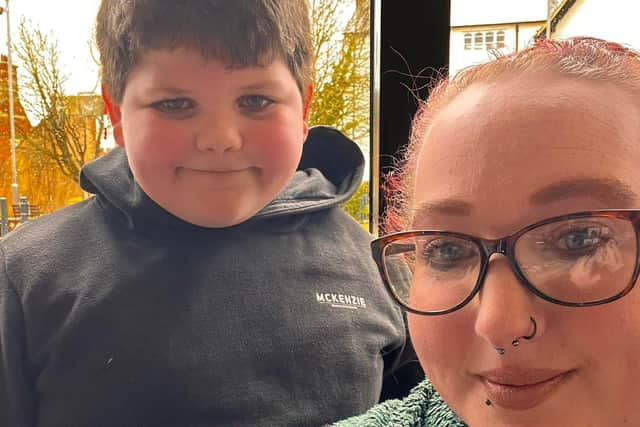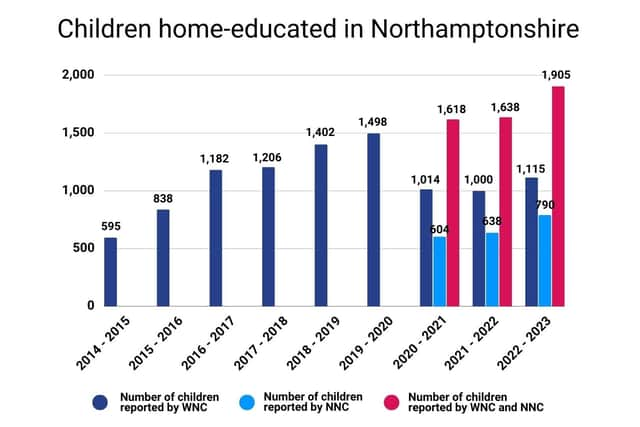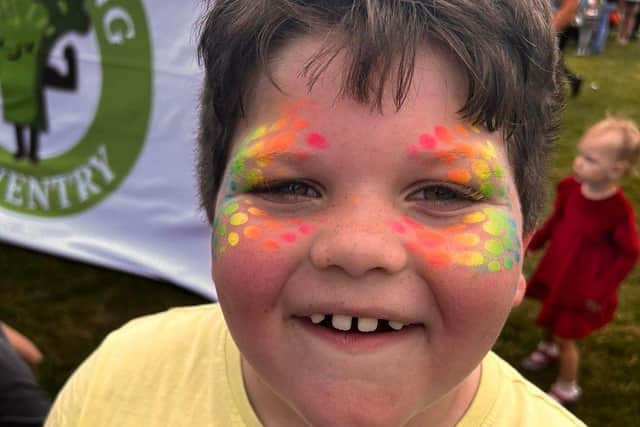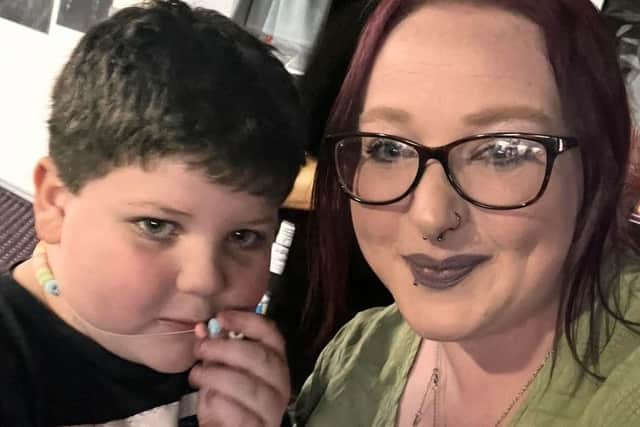Councils in Northamptonshire see sharp rise in homeschooling over the last decade
and live on Freeview channel 276
More Northamptonshire families have opted to formally remove their children from school, as new figures show a surge in the number of children being educated at home.
The number of home-educated students in Northamptonshire has almost tripled over the last decade, Freedom of Information requests (FOI) reveal. In the two local authorities that provided data, 595 children were learning at home in 2014, compared to around 1,905 a year ago. But the true numbers could be higher.
Advertisement
Hide AdAdvertisement
Hide AdThe figures – obtained by this newspaper using FOI requests – show the number of children in Northamptonshire who received home education each year from 2014 to 2023.


Emma Reeve, 32, from Daventry, is a mother-of-three and two of her children are home-educated. She said: “I've noticed it's becoming a lot more popular in Daventry. There's a lot more children that are home-educated.”
Emma’s eldest son is 14 years old and receives his education at home with eight-year-old Frankie, who is diagnosed with autism spectrum disorder (ASD). Gracie, Emma's 12-year-old daughter, is enrolled at a Daventry school.
“If you feel like your child is not progressing the way you would like them to in school and the school system is more detrimental to your child, you're well within your rights to pull your child out of school.
“You can change your mind down the line,” said Emma.


Advertisement
Hide AdAdvertisement
Hide AdEmma has been homeschooling her sons for more than three years.
“You don't have to be qualified to home educate. Anyone can do it,” said Emma.
The mother shared that her eldest child started off attending a Daventry school.
“We decided that home education was the best route for him. He had a lot of mental health issues, and the school was just not supportive at all,” said Emma.


Advertisement
Hide AdAdvertisement
Hide AdParents are not required to follow the national curriculum or have premises equipped to any particular standard.
Emma shared that people should not be afraid to let go of rigid homeschooling schedules that are not working for their families and embrace a looser routine. She believes that she provides the same level of education that her children would receive in a school.
She said: “I believe that especially my eldest child receives more of a practical education that schools don't teach you.
“Go with what is best for you and your child.”


Emma’s homeschooling advice for parents is to join local groups for community support as well as check out the free online tips and resources to make learning at home as effective as possible.
Advertisement
Hide AdAdvertisement
Hide Ad“You are kind of on your own with finding your resources. The local authority will help you, but it's very limited,” she said.
There is no obligation for homeschooled children to sit exams; however, as homeschooling is considered private education, the parents of homeschooled pupils who choose to sit examinations such as the GCSE are responsible for the full cost of both the learning material and sitting the exams.
Emma said: “My eldest has looked into college. He is still undecided, but it is a possibility.
“You do have to pay for exams, and it can be quite costly. It comes right down to you, and you don't get any financial help.”
Advertisement
Hide AdAdvertisement
Hide AdIn a FOI request submitted by this newspaper, West Northamptonshire Council (WNC) revealed the number of children reported to be home-educated at some point during the 2014–2015 academic year was 595.
There has been a consistent increase in the number of children receiving home education throughout the years.
The number of children reported to be home-educated in the West Northamptonshire area at some point during each academic year since the unitary split took place on April 1, 2021, was 1,014 in 2020–2021, 1,000 in 2021–2022, and 1,115 in 2022–2023, with the latter figure being provisional, according to WNC.
Reflecting on the data, Emma said: “I think maybe the pandemic would have had quite a hit on it.
Advertisement
Hide AdAdvertisement
Hide Ad“That is a real serious concern for that number of children to be taken out; the schools are not meeting the educational needs or the mental health needs of these children.”
In another FOI request submitted by this newspaper, North Northamptonshire Council (NNC) revealed the numbers of children reported to be home-educated at some point during each academic year in the area covered by them were 604 in 2020-2021, 638 in 2021-2022, and 790 in 2022-2023.
In total, around 1,905 children were home-educated last year in Northamptonshire, which is more than three times the number of pupils who received home-education in 2014.
“Now you can argue that some of these children had a lovely time at school, and the parents have just decided this is what they want to do. But how many of those parents have done it because they felt they had no other option? That's really scary, and something needs to be done about it,” said Emma.
Advertisement
Hide AdAdvertisement
Hide AdAn increasing number of parents are now choosing home education because they feel the current school system cannot meet the needs of their children, according to Emma.
“Frankie fell through the cracks, and it got to the point where he was permanently excluded.
“Even though he's got a diagnosis, I cannot get him into a SEND school. I've been trying for three years now. There's just no room,” said Emma.
Frankie wishes to return to school, and Emma is very supportive of it.
Advertisement
Hide AdAdvertisement
Hide AdProspective homeschool families frequently worry about homeschool socialisation, but in Emma's experience, this has not been the case. Her homeschooled children still engage socially with their friends and develop friendships outside of a classroom setting.
Emma said: “There are a lot of opportunities to socialise. There is a huge community online. Everyone's lovely and really supportive. You don't feel like you're on the journey alone.”